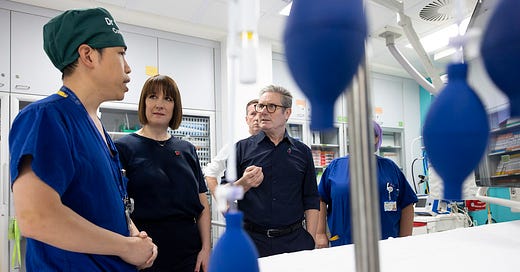The Budget contains no convincing proposals to make the public sector work better
Rachel Reeves has a somewhat flexible idea of the difference between current spending (bad) and investment (good).
Could this Budget come unravelled? It suddenly seems a long way to November 6th and the formal vote on our first female Chancellor’s offering. So far, the verdict of the markets is not encouraging - it’s her bad luck that bond markets across the world are looking soggy, as traders view incontinent governments across the developed world with increasing unease.
Yet it is not only the markets that are looking soggy. The Budget maths is also looking unconvincing, as the package looks more and more like an old-fashioned Labour tax, borrow and spend affair.
The centrepiece, the rise in employer’s National Insurance, is supposed to raise £25billion, but the Institute for Fiscal Studies reckons it will produce little more than half that. The cynical way that she excluded the public sector employers from the extra levy has undermined any belief that she understands how business works.
The changes to inheritance tax have introduced uncertainty into what is a long-term commitment, and outraged the farming lobby. Farming’s position in the national psyche is out of all proportion to its contribution to the economy, but it is a brave woman who takes on Jeremy Clarkson and his army of fans.
Even the most rock-solid of Labour’s manifesto pledges is crumbling at the edges, as the private schools prepare a legal action against VAT on the fees.
None of this would present a serious threat to the Budget, which nobody expects to be voted down, but the plans not only involve a lot more debt than expected, they contain no convincing proposals to make the public sector work better.
Rather, a lot more money will be spent quickly, in the hope that somehow it will be spent wisely. Given the history of big public sector projects, that is a true triumph of hope over experience. The state values covering up the embarrassments of cost overruns more highly than admitting them. The fig leaf of another quango to watch costs will not alter that.
It is all very well to talk about laying the foundations for growth, but, like Gordon Brown before her, Rachel Reeves has a somewhat flexible idea of the difference between current spending (bad) and investment (good).
Besides, investment is only worth doing if it is worth more than it costs. The shadow of HS2 reminds us of how badly public sector projects can go wrong.
The acid test for this chancellor, by her own admission, is economic growth. The signs do not look good. If the bond markets sense weakness, the price can be brutal. It could be a very long weekend.






